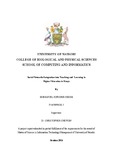| dc.description.abstract | Problem
The recent innovations in ICT have seen an upsurge in social networking platforms. Everyone
is using at least one of the many Social Networks platforms. Lecturers are facing new
encounters on how to leverage the positive aspects offered by the social media platforms. The
integration of social networks to enhance and complement other teaching methods is thus
hampered. Various educationalists feel that social networking is inherently disruptive to the
education process. Learners can access them on any computing device. Social Networking
platforms help learners become communally and scholastically integrated as well as improving
learning amid not being used in institutions of higher education for teaching and learning.
Objectives
The researcher wanted to find out the integration of Social Networks into teaching and learning
in the institutions of higher learning. More specifically, it was looking into the pedagogical,
social media usage skills, the attitudes, and perceptions of lecturers towards integrating these
technologies into teaching and learning. The preparedness by the institutions for social
networks integration and hurdles encountered while integrating these technologies were also
examined. A framework for social networks integration into teaching and learning was
proposed.
Methodology
A survey approach was adopted for this research. This employed a questionnaire sent to the
respondents. The collected data was analyzed and presented. Regression and correlation
techniques were used to check the associations amongst the variables and the significance of
the variables to the study. TPACK framework by represented better the integration compared
to "Modeling educational usage of the Facebook" framework by Mazman and Usluel.
Results
Results showed that Social networking is not a new phenomenon to most of the respondents.
The majority of the lecturers use Social Networks platforms but mainly for personal use. They
should be motivated to repurpose these platforms for teaching. Lecturers attitudes and
perceptions, pedagogical and technological usage skills are crucial while planning to integrate
social networks into teaching. This is because they are the primary content deliverers. The
v
availability of sufficient internet connection, computing devices, and ICT support services
shows that the institutions are prepared. Challenges pointed out include privacy concerns, data
security, policies to guide integration, management support among others. The findings can be
used while formulating policies in the education sector.
Conclusion
This study examines social media utilization by lecturers in institutions of higher learning. The
findings strengthen the pedagogical and technological theory base for sound decision making
in social media use in teaching and learning. The lecturers, being the content deliverers, are
key in determining the success of the integration. Thus, they should be motivated to champion
the integration of social platforms into the learning process.The higher learning institutions are
prepared for the integration of social media into the learning process due to the availability of
sufficient computing devices and internet connectivity. Proper guidelines, management support
and user training should be put in place to address some of the challenges raised by
lecturers.Future studies should further examine the role played by Institutions’ support
programs in encouraging faculty to re-purpose social media usage, the role played by training
sessions in supporting its use and also the role played by the type of subject taught and how
the chosen social platform fits the subject. | en_US |



